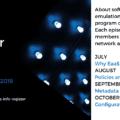
EaaSI Metadata Model and Wikidata
This webinar, entitled “EaaSI Metadata Model and Wikidata,” addresses questions such as: How does your organization create, manage or discover metadata about software and related resources now? What would you like to be able to do with software metadata? Do …Continue EaaSI Metadata Model and Wikidata
Resources, Webinars

Participatory Design for Software Preservation and Emulation Services
Presentation given at the International Conference on Digital Preservation (iPRES) 2018
Presentations, Resources

Complex Data Sets, Software Preservation, and Emulation: A distributed approach to long-term care
Presentation given at Research Data Archiving & Preservation (RDAP) Summit 2018
Presentations, Resources
Participatory Design for Long-Term Access: User Research, Software Preservation, and Emulation
Presentation given at Open Repositories 2019
Resources
EaaSI Tech Talk User Group
More conversational, forum-style technical discussion and troubleshooting among the EaaSI network can also be viewed on the EaaSI Tech Talk Google Group.
External, Resources
EaaSI GitLab
System requirements and the EaaSI User Handbook will be hosted on GitLab to allow for seamless integration with our development team’s workflows, and easy access for Node Hosts to bug tracking. All publicly-available repositories and code can be seen at …Continue EaaSI GitLab
External, Resources
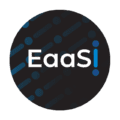
Historical Quasi-Artifacts and Interdepartmental Teams
Our Motley Crew The EaaSI node here at Carnegie Mellon began as a collaboration between two Computer Science Liaison Librarians — Jessica Benner and Huajin Wang–a project archivist with University Archives — Emily Davis — and a computer scientist and …Continue Historical Quasi-Artifacts and Interdepartmental Teams
News, Staff Updates

In-Person Meeting Exercises
EaaSI Node Leads convened in November 2018 to review the EaaSI beta implementation process, discuss service design for emulation in local organizational contexts, prioritize project activities and review the Participation Agreement drafted in partnership with the Harvard Law School Cyberlaw …Continue In-Person Meeting Exercises
Resources, Templates

Software Collections Inventory
EaaSI Software Collections Inventory is what is sometimes referred to as a Random (or spot) inventory. Random (or spot) inventories are extremely limited in scope. They are primarily used to verify the location of a representative sampling of objects. They …Continue Software Collections Inventory
Resources, Templates

Scenarios for (Re)Use & Access
EaaSI Scenarios for Use & Access asks each Node Host to brainstorm scenarios for use and access they believe will drive the adoption of EaaSI; identify users whose use cases they believe may correspond with the scenarios for use and …Continue Scenarios for (Re)Use & Access
Resources, Templates

Semi-Structured Interviews
EaaSI Scenarios for Use & Access asks each Node Host to brainstorm scenarios for use and access they believe will drive the adoption of EaaSI; identify users whose use cases they believe may correspond with the scenarios for use and …Continue Semi-Structured Interviews
Resources, Templates

Notre Dame University
As scientific research is increasingly born digital, more researchers are using computational resources for simulations and data analysis. Participating in EaaSI is a way we can act on cloud advantages for emulation processes in digital preservation. Our most compelling use …Continue Notre Dame University
Participants
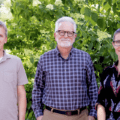
University of Virginia
The University of Virginia Library is an enthusiastic participant through the Software Preservation Network in Yale’s Emulation As A Service Infrastructure (EaaSI) project. We are motivated strongly by the urgent need to preserve software in ways that make our preservation …Continue University of Virginia
Participants
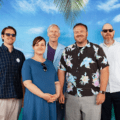
University of California – San Diego
The UCSD Library’s Research Data Curation program has been working with UCSD researchers for over half a decade to curate and preserve the research data produced by our campus. Our large and quickly-growing collection of research data contains long-tail research …Continue University of California – San Diego
Participants
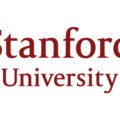
Stanford University
Stanford University has large collections of historic software which are currently inaccessible to our researchers. We are also actively collecting software that has been developed by our faculty for classroom use and by authors of digital publications for the Stanford …Continue Stanford University
Participants
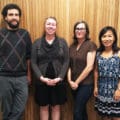
Carnegie Mellon University
Most modern activities are dependent in some way or another on a dense network of software and its related technical dependencies. In order to ensure continued access to human knowledge production it is imperative that software preservation become a significant …Continue Carnegie Mellon University
Participants
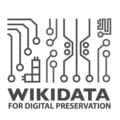
Kat Thornton
Katherine Thornton is an information scientist working on creating metadata as linked open data. Kat works on the Scaling Emulation as a Service Infrastructure (EaaSI) project describing the software and configured environments in Wikidata. Kat has been a volunteer contributor …Continue Kat Thornton
Bios

Klaus Rechert
Klaus is a Computer Science researcher with a focus on functional preservation, emulation as a preservation strategy and digital forensics. Over the last 6 years, Klaus has assisted in the implementation of emulation solutions in a range of organizational types …Continue Klaus Rechert
Bios
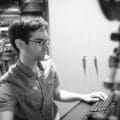
Ethan Gates
Ethan Gates was a double English and Russian major at Amherst College and is a graduate of NYU’s MA program in Moving Image Archiving and Preservation. For several years he worked as NYU-MIAP’s staff Technician, coordinating equipment maintenance, use, and …Continue Ethan Gates
Bios
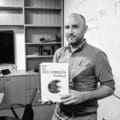
Euan Cochrane
Euan manages the Digital Preservation Services team at Yale University Library – responsible for the Library’s digital repository and providing related preservation services to the university. Euan is excited to see many years of emulation and software preservation work come …Continue Euan Cochrane